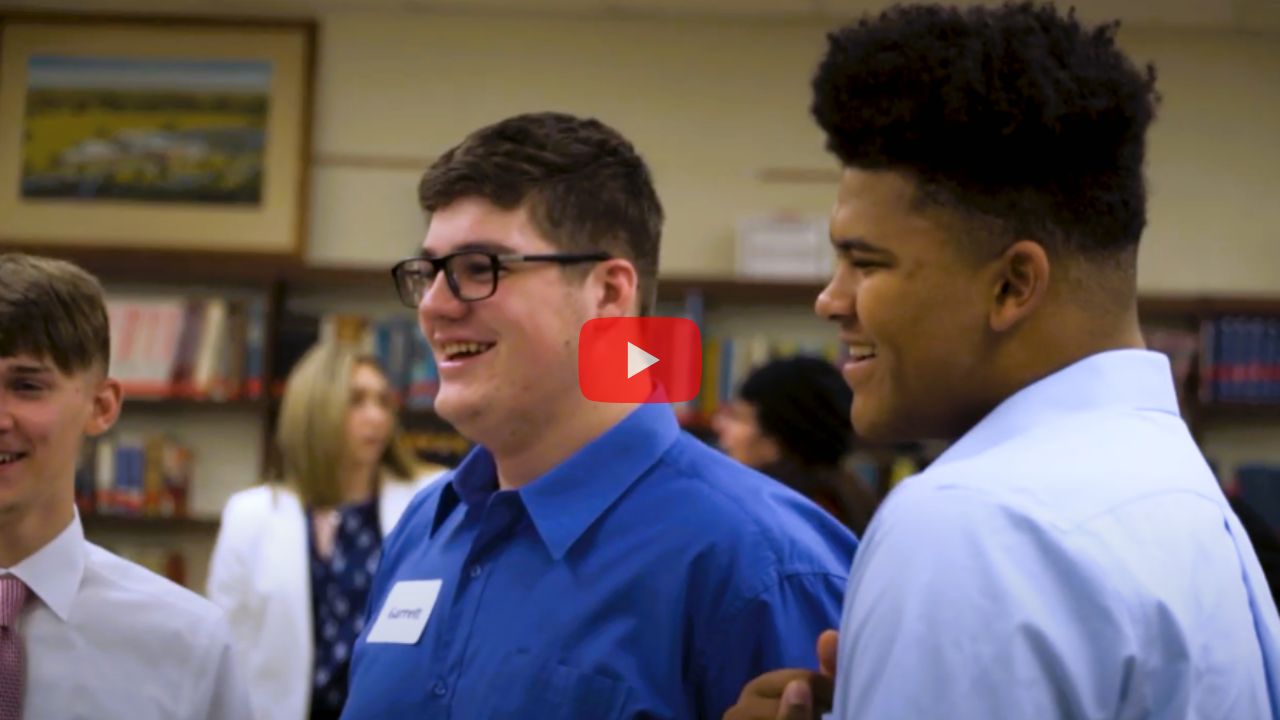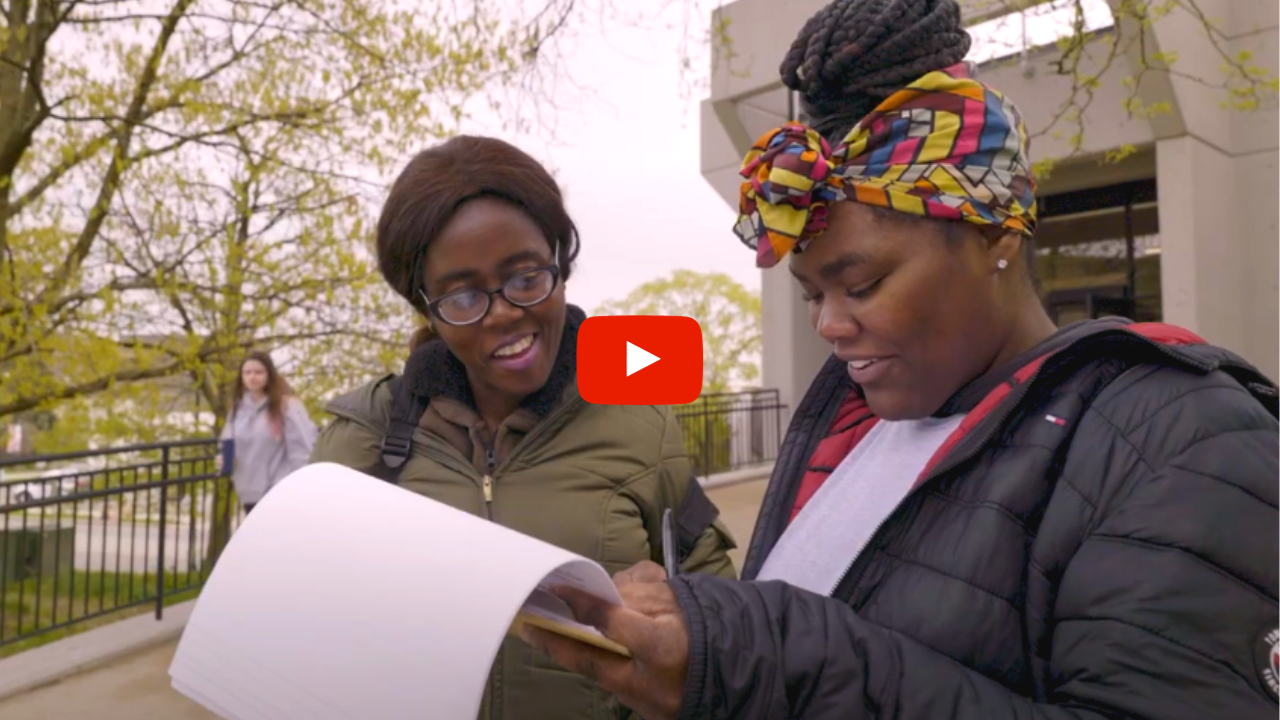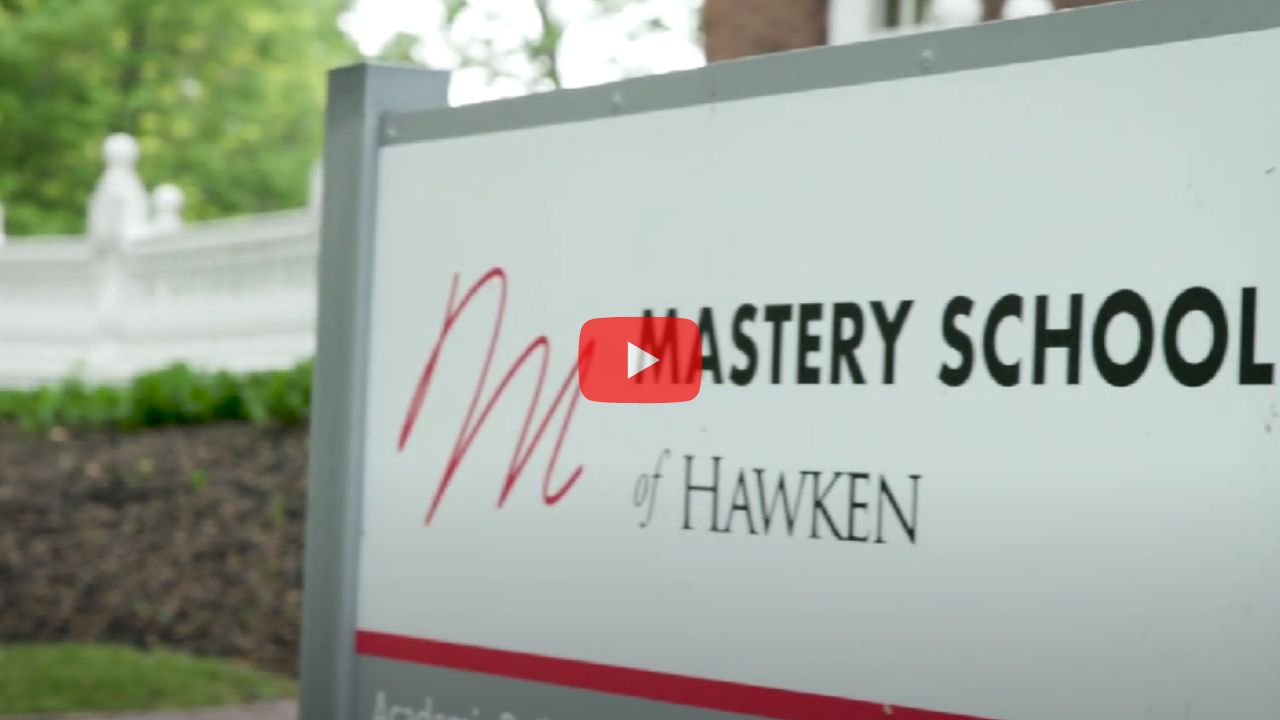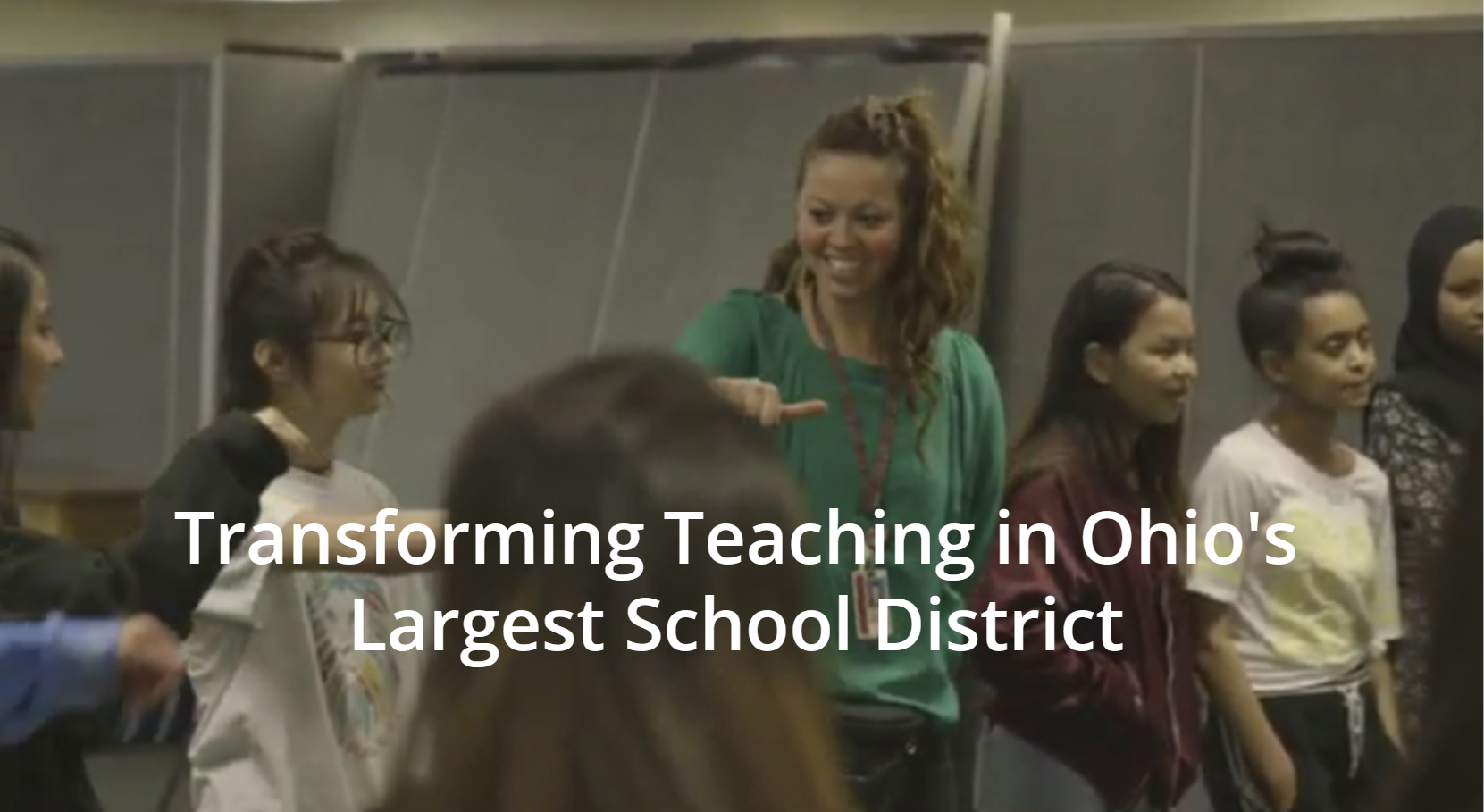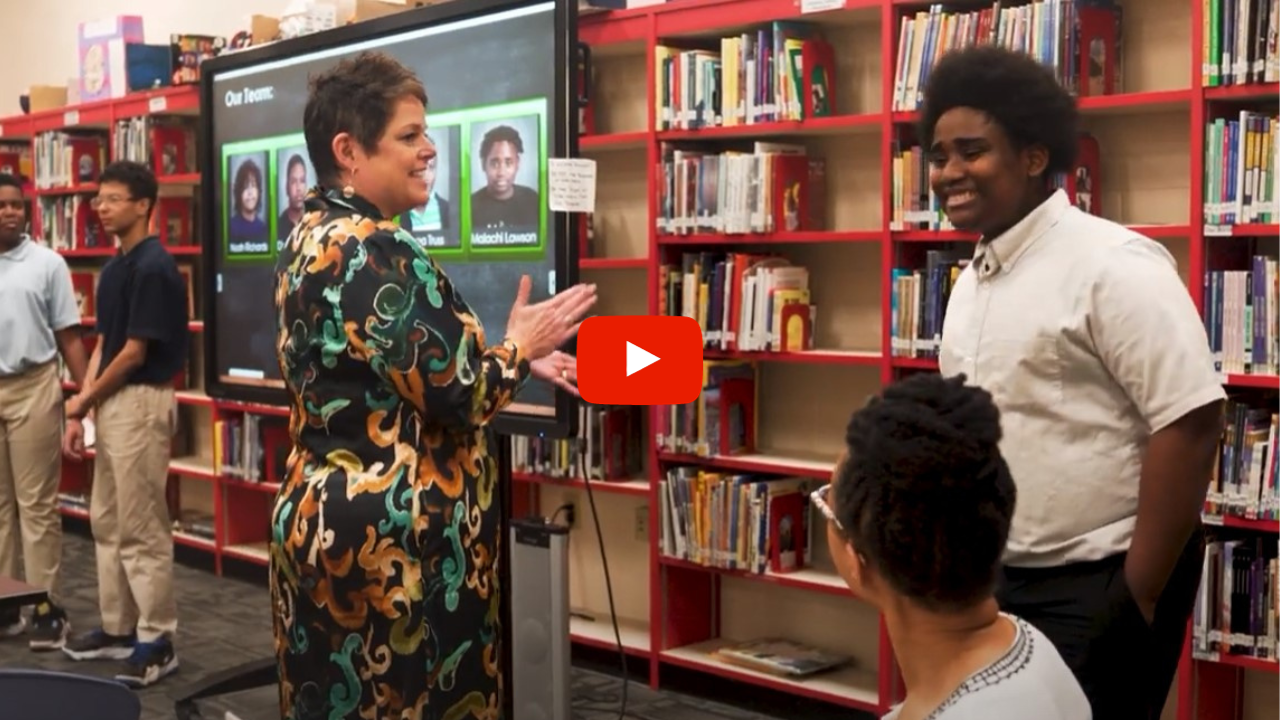In this episode, Doris talks with Renee Bischoff, Director of College Counseling at the Hawken School. Renee shares insights on the impact the entrepreneurship program has had on students, including their personal and academic growth as well as their readiness for college.
Renee: Well, I generally get students in my office space sometime in the beginning to the middle of their junior year and typically, those are kids who are under confident about life at that point because…what? They’re 16 years old and they don’t really know what they want to do. So when they are enrolling in your program, you know, that’s the, sort of, space they go into and one of the things that’s been terrific for me about your program is it’s academic but it’s incredibly, incredibly developmental and I can give you a couple of personal examples of kids.
So there’s a kid, Chase, who was a little lower on the academic end and decided to sign up for your program because the subject really interested him and he also thought that it seemed like a program that might stretch him a little bit. Because of our school’s intensive program, he already knew that learning in a format where he was going to be in the same space for a long time was something he liked. So I think he, sort of, viewed your program as super intensive.
So he, kind of, jumped into that and in some ways, he’s a risky kid because he’s like “Well, what do I have to lose? My grades are not fabulous anyway. Like, this program, what’s it going to do?” And I think what he really discovered in the program is that he had more skills and talents than he thought he did. So Chase is a kid who would’ve described himself as not being very strong quantitatively and in fact, his transcript shows that. But what he ended up doing in Entrepreneurship was a lot more research and quantitative analysis on businesses and he actually discovered that math has a real purpose and the other thing that he brought to the table was he was a little bit of a clown, a little bit of an…I would describe him as a little untethered when I first met him, and disorganized.
What Entre did for him partly through the leadership of the teachers in the class but more through his peers was an ability to really think about “What do I want to get done? How am I going to organize my time? And what does it mean to be respectful of others? And why does it even matter?” So when he got up to give a presentation, you could literally see all of these skills coming together in one place and I remember the first time I saw him present and he stopped, it was at the end of the presentation. It was like one of those people who went on stage and didn’t really remember what happened. And I remember thinking “There it is. This is who this kid really is.” And that, to me, has been the moment for many, many kids in this program is I know it’s going to happen. The kid doesn’t quite know it will but I do and I think you do is at one point I’m like “There it is. That kid just showed up.”
So another example is a kid named Greg who did not…again, school has not always been his great space but presented last spring on a product that was designed to help cancer patients. And it was really a care program and his interest in this was helping spouses, men typically, of women who are going through treatment. And the empathy that he showed in the presentation, the thoughtfulness and care…when he got done with the presentation and he got off the stage, I walked to him and I said “Sorry, now I know who you are. And the reality for you is you’ve got to show up every day just like that because now you know who you are.”
And what that’s transformed in for Chase and for Greg has been increased academic confidence outside of Entre so their other classes…their grades are getting better. But I would even go farther than that and say that these are young men, and I can give you examples of young women, who understand what they want to learn. So when Chase went off to look at colleges, he just finished his college process. He wasn’t thinking about “Am I going to be so lucky to get in?” He actually was looking at it as “Which school is going to be the best place for me?” And quite honestly, as a college counselor, that is, like, my dream, to have a kid who could do that. And in Chase’s case, again, not a GPA that I think most people would be excited about in the college process. He upsold himself by being able to talk about his academic transformation and his personal transformation as a learner. And in all of the years I’ve done college admissions and college counseling, the authenticity of a young person who wants to learn is what makes an admission officer believe.
And at the end of the day, even there’s numbers and metrics. It’s a human process and what Chase learned through this is he’s a human being with value in the process and so I think his agency, as he goes forward in college and in life, is going to be about “What am I responsible for?” In a way that’s confident.
Doris: Yeah, one of the things…I was with a student very recently and one of the things he said was that in classes before Entre he was always struck by what he wasn’t good at and when he got into Entre he started discovering where he was strong and he had avenues for that. And then he also found in the process, like you said, things that he could do that he…turns out he’s very analytical and very strong quantitatively. He just didn’t know that before.
Yeah, what about the students who are more driven in traditional academics? The kind of students who come in and have been, you know, performing well on tests, taking the high classes, etc.
Renee: Well, I think for those students, the entrepreneurship program, first of all, I want to say, is incredibly rigorous. So I think my view on this has always been the case that Advancement Placement doesn’t necessarily make the class a better class. I mean, the College Board puts that label on classes and says they’re hirable but that doesn’t mean that you can’t learn just as much, if not more, in another class. The College Board doesn’t have the whole line on rigor.
So I think for some kids, they come into the program maybe thinking it’s not going to be as rigorous, but they quickly find out it is. I think what’s interesting about it for kids who are structured and I would say are…these are the kids who are fixated on GPA, is that quickly gets put aside. Because one of the things these kids are really focused on and worried about is their work and how they work in groups and that’s my favorite part of the Entre program is everybody’s personality gets thrown in and they all have to learn how to deal with each other.
And if there’s anything I’ve learned about high achieving kids is they do appreciate and crave a dose of reality. So I can give you an example of Laura, who was a pretty high achieving, GPA protective, kind of kid. Always wanted to know what was going to be on the test. Was, “What was my grade? What was my grade? What was my grade?” and finally, in this program, got called out by her own peers like “Cut it out. We have work to do. Like, just let it go.”
And I think the Entre program provides a real space for kids to have those conversations with each other and at one point I remember talking to Laura about this and she said “I’m just so worried I’m not going to get a good grade. It’s so important for college.” And her friends were around her and said, “Well, of course you’re going to be fine, because if you do great work, the work of your team will support you and then the grade just happens. It’s not about you getting a grade. It’s about you working and having some sort of assessment that reflects your work and real commitment to the program.”
And once she understood that, her work got better. You know, it’s almost like you have to take grades off. So I love those kids going into the program because I feel like they’re finally going to go to college and not be so stressed out. I mean, there’s a real mental health problem going on with college kids these days and it’s because kids are so tightly wound and I feel like Entre allows this space for them to…It’s crazy because they actually work harder in the Entre program than they do in any AP class. They always tell us that. Like, “I’ve never worked so hard in my whole life and I’ve never loved anything so much, but I never also was in the space where nobody wanted to talk about the grade.” And I think that’s a really important space for kids and they also learn that just because they get As, it doesn’t mean they’re the best.
Doris: Yeah, I think…
Renee: And that is important for them.
Doris: Yeah, I think so. I think one of the things that very quickly changes things for those kids is when they realize they’re working on real problems. They’re working on real things, problems that haven’t been answered yet. Do the students ever talk to you about that? About the difference in terms of the work itself?
Renee: I mean, so I always feel terribly for the kids who do Entre early and then have to go back to regular school, because they had a chance to work with amazing companies and amazing mentors and then at the end of the program where they get to design their own organization. To have to go back to school and just learn Latin, where they don’t… you know, again, not that they don’t care about it. They do care about it, but I think they see a real purpose in what they’ve learned. What I appreciate about it is then we start to talk about colleges and we start to think about programs.
And one of the misconceptions about the Entrepreneurship program is that every kid who goes into it is a business person. That’s 100% true. I mean, there are plenty of kids who go into it thinking “Oh, I really would like to have a career. I like this idea of working in the business world, but plenty of kids who come out of Entre thinking more about what it’s like to learn and what it’s like to work in organizations and I think, from the college end, what I hear from them is “Boy, these kids out of this program are terrific leaders. I want this kid to be an orientation leader. I think this kid will be a great resident assistant. I think this kid would be amazing at our experiential learning program internships.”
And what I think…I had a funny commentary from a girl, Dana, who went out and visited colleges this spring and she critiqued the presentations and she said “Ms. Korda would not like any of these presentations. These presentations are not up to standard.” And this is a young woman who I thought would be terrified of looking at colleges, and in fact, she is looking to find the college that will be the best place for her. She’s evaluating them, not them evaluating her. So I think it puts kids into a space as designers of their own future.
Doris: I love that. I think that with a lot of the students that we’ve had, coming into the program their view of themselves is narrowly defined by very specific metrics. “What is my GPA? How well do I do on tests? Am I good at memorizing? Do I get the math problems quickly like the guy sitting next to me?” And when they get a chance to work on real things that they care about, that are really hard actually, much more difficult because they’re real and not yet solved. I think they do start, in a bizarre way, to relax about themselves.
Renee: Yeah.
Doris: Maybe that’s not the right word but the way you’re describing it, that’s…
Renee: Well, and this is the other thing. I mean, I almost feel like you could title this podcast, you know, something like, “What does Hot Chicken Takeover have to do with life anyway?”
Doris: I think that’s awesome.
Renee: When you hear kids talk about Hot Chicken Takeover…I mean, first of all, best company name ever, but also a really fascinating…That’s, sort of, a microcosm for what this course is trying to teach kids. What’s the misconception? How do we break those myths down? And then how do we add value? And I mean, that’s a company with a really thoughtful, purposeful mission, with a real problem.
Doris: Yeah.
Renee: Not, like, a problem like a bad thing but a problem like an opportunity and a way to think about…the trajectory of that company is, kind of, like the trajectory of our kids. How do you do something with meaning that provides value? But I remember when a group of kids came back from that thing and said “Yeah, we’re working for Hot Chicken Takeover.” And I said “Are you going to school?” And they’re like “Oh, we’re doing more than that.”
I mean, when kids can come and…or Choolah, you know, the idea that they were going to be on the forefront of a company’s evolution, or the Sauerkraut Company. I mean, you know, we can go on and on about the examples. These kids are going to go off to college and say “Yeah, we worked for the sauerkraut company.” And their peers are going to say “What?”
Doris: Right, right, and actually learn statistics and big data as a result of that.
Renee: Well, and the fact is what does sauerkraut have to do with biomedical engineering? In fact, it has everything to do with biomedical engineering because you can’t learn how to do that if you…I mean, so I think this is, sort of, an interesting way to think about that and again, you do have to have fundamentals. I think part of the issue on the college side at first with Entre was they were worried that this program was just a soft program without hard skills. And our kids…I mean, I didn’t have to worry very long about that, because you give a kid 15 minutes with a college admission officer and that college admission officer is walking out saying, “We don’t have a program at our college like this.”
And so I think we’ve seen in the past few years a lot of high schools have programs like Entrepreneurship, colleges have programs like Entrepreneurship or they’re adding them. I think the question is how do you do your Entrepreneurship.
Doris: Yeah, yeah. It’s like a lot of other things. It’s how you do it, right? Yeah, they…right, you mentioned the sauerkraut company. They had to learn a lot of science.
Renee: I mean, seriously, I hear sauerkraut and all I can think of is kielbasa and then I’m out because I just…yeah.
Doris: Yeah, no. It’s really something. When you think about…you brought up a student…you brought up that colleges…students have been telling us that many of them send their portfolios in from this class and that you, then, have conversations sometimes, I think, with the admissions officers from colleges. And do you see increasingly colleges looking for students with these kinds of skills?
Renee: Yeah, absolutely. There’s a young woman, Christie, who produced this amazing portfolio and presentation for a food distribution…I’m trying to remember what the name of that company was but they…Do you remember?
Doris: The CCLK?
Renee: Yeah.
Doris: Yeah. Cleveland Culinary Launch Kitchen.
Renee: Right, so she produced this amazing presentation and when we were going through her college list I said “You know, I feel like if we don’t send this portfolio in, we’re missing who you…this school is not going to understand who you are.” And unfortunately, sometimes on the application there’s not a space for that. So we made a plan to get her in contact with college admissions folks and she sent a link and wrote a really lovely message saying, “This isn’t going to take 15 years of your life. It’s going to take, like, five minutes. And if you would look at this you will have an understanding of what I’m doing in the class and why I think the program at your school is a good fit for me.” And she got a lot of positive feedback from that.
And I think, in some ways, if you can get the colleges to take five minutes to see something that a kid has really produced versus something that’s been manufactured. I think a lot of essays can be manufactured. They were able to put her academic profile more into context. So for example, there are smart kids, right, with good grades, good scores but then there are kids who are intellectually curious, adventurous and kids who are willing to dive in and engage below a superficial level. By her sending her profile…and sometimes it’s even listening to things like podcasts when the kids are reflecting on their journey. Those are pieces that the colleges find to be real.
The issue right now is they feel like kids are too packaged and Entre takes all of that away. They can’t help but be authentically who they are.
Doris: Yeah, I think I used the word democratizing, that this kind of education’s democratizing. I was talking yesterday with one of our attendees who’s working with low income students in a public school in a community where they’ve really been hit by hard times. And she was talking about how this kind of education, this kind of program is going to give these kids a chance as they leave high school to compete in college and beyond. I guess the question I would ask whether it’s an independent school, public school, whatever, the kind of program we’re talking about where students learn these kinds of skills. You’ve been in schools for quite a while. Why is this important now?
Renee: Well, I think it’s more important than ever and particularly now because when students come to school, it’s time and it’s money and there’s a real search for value. So when the market crashed, you know, parents became very nervous about the value of the child’s education and I don’t quite understand why costs continue to go up. They do, and so we need to develop the ability in young people to take advantage of opportunities when they’re presented.
I had a British parent who said to me “American college just seems like four years of expensive daycare.” And I think from his perspective and the way he thinks about the system, I think that’s kind of right. We need our kids to not approach college that way. And so for somebody coming from a school system like the one you described, this mentor wants her young men and women to be able to get to college and know how to find the academic advisor and know how to get the resources and support. And this program gives kids confidence to do that. I think that’s a really important skill.
We hear stories all the time about colleges who have parents who call up to complain about grades. I heard a story recently about a mother who went to a job interview with her college graduate son. And the reality is that system is not going to work and the kids who will actually be successful are the kids who can show that they can manage things. Not perfectly, I mean, these kids don’t come out fully formed. I mean, they’re still messy, they’re teenagers. But I do think that their skills and their ability to interact in the adult world is incredibly important. So I think that’s the real thing is their transition into the next world is going to be much easier because they know how to manage some of those conversations that…
I mean, do you remember when we were little kids people would have to answer the phone? There was a way you had to answer the phone.
Doris: Sure.
Renee: Kids aren’t on the phone anymore. In Entre, kids have to go and talk to the CFO.
Doris: And the man on the street and the woman on the street.
Renee: Do you remember a student who, a couple of years ago, emailed the CEO of the Cleveland Clinic because he was working on a project and was totally surprised to get a reply back from Toby Cosgrove saying “Yeah.” And if I had known that that kid had the ability to even do that and then have a follow up conversation…I mean, to me, that’s really another hallmark of this program is giving kids the confidence to do something like that.
Doris: Well, thanks for everything Renee and you do amazing work and it’s exciting to see the progression of education not only at Hawken but, you know, there are lots and lots of schools now doing this kind of thing.
Renee: Yeah, I think it’s amazing.


